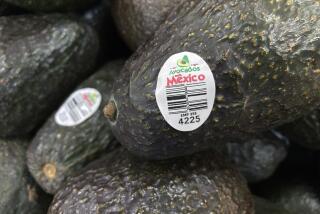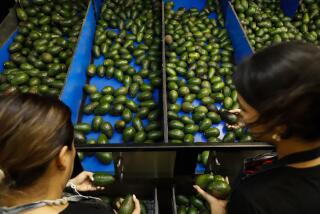Firm to Promote Sale of Foreign Avocados
- Share via
A decision last year by the U. S. Department of Agriculture to lift a longtime ban on the export of Mexican avocados into the continental United States was opposed by many domestic growers, who feared the spread of seed weevil infestation to their crops.
But for at least one local avocado distributor, the decision to allow sales to 19 states in the northeast and Midwest from November through February may be the key to the company’s future.
Ventura-based Fresh Directions International was founded in July 1997, five months after the 83-year ban ended. The company has established relationships with Mexican avocado growers and will begin U. S. sales in the coming months.
To launch its domestic presence, Fresh Directions has hired Camarillo resident Mike Haynes as director of domestic sales. In addition to selling Mexican produce, Haynes will direct the import of avocados from the company’s partnerships in the Dominican Republic.
“Fresh Directions started out as an export company out of Mexico and the Dominican Republic, and we have a large percentage of the Asian market,” Haynes said. “My role, in essence, is to coordinate the thrust of our import deal.”
Haynes spent five years as a tomato and vegetable seller with the Los Angeles-based Tanimura Distributors produce firm.
Mike Browne, president and chief executive of Fresh Directions, said the newly open market of 19 U. S. states required the hiring of an experienced sales director.
“He fits in well with the idea that we have to go national,” Browne said of Haynes. “Forty-three percent of the population lives in those 19 states and they only consumed 16% of the [avocado] product. The primary problem has been that national consumption has been based on what California can produce, and California has limited production, and the growers like to stay in the West.”
Fresh Directions will distribute the Mexican and Dominican avocados during the winter months, when they are not grown in the United States.
More to Read
Inside the business of entertainment
The Wide Shot brings you news, analysis and insights on everything from streaming wars to production — and what it all means for the future.
You may occasionally receive promotional content from the Los Angeles Times.










